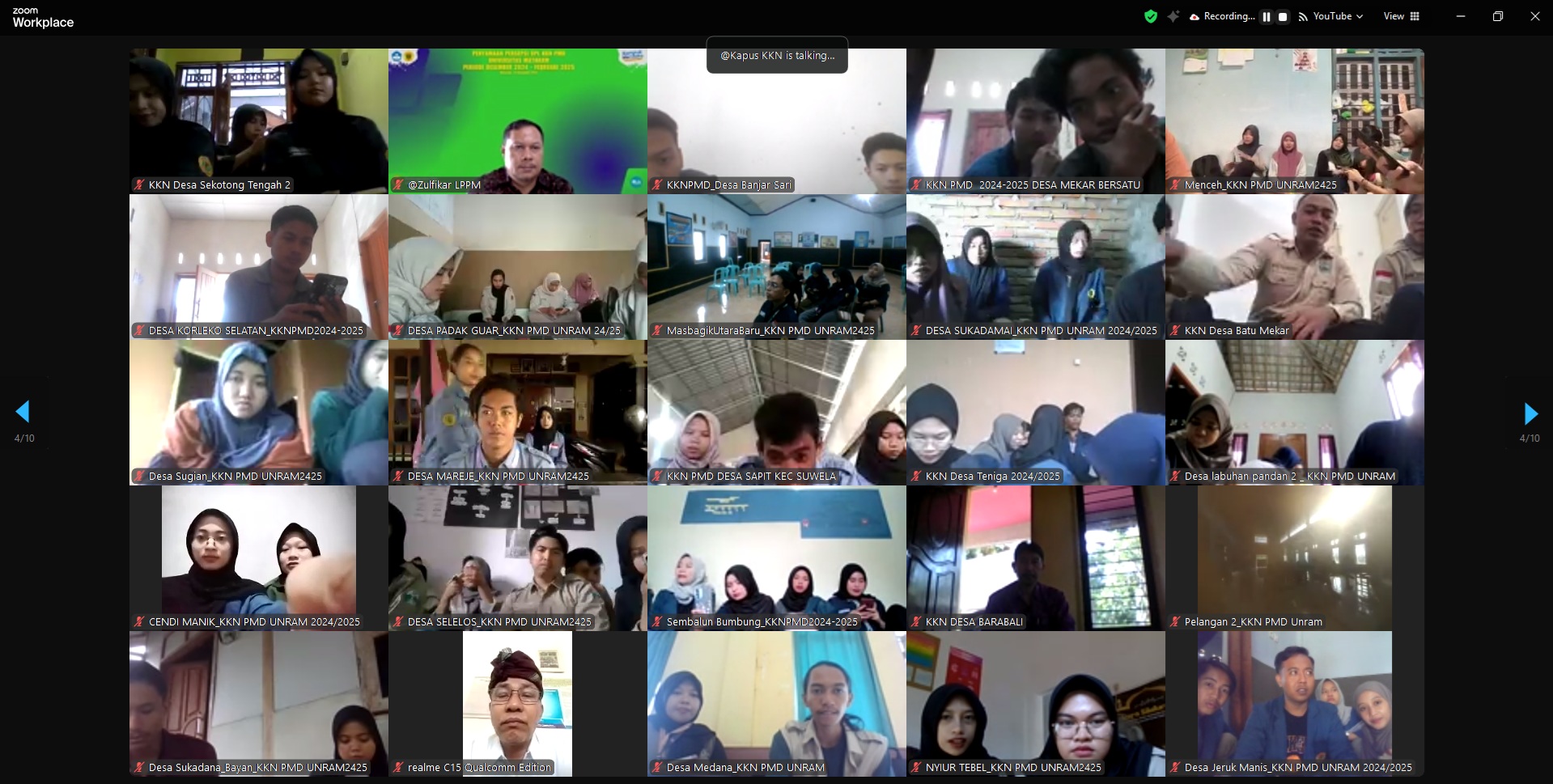Withdrawal of Unram PMD KKN Students 2025: Realising Empowered and Sustainable Villages

Mataram, University of Mataram – The Institute for Research and Community Service (LPPM) of University of Mataram (Unram) officially withdrew students participating in the Real Work Study (KKN) of Community Learning and Empowerment (PMD) for the December-February period in a closing ceremony that took place through a zoom meeting on Thursday, 6 February 2025.
This activity marks the end of the service period of 2,131 students in 213 villages in 6 districts, both on the Lombok and Sumbawa islands for 45 days. Through this programme, they applied the knowledge gained in college to help community development, ranging from education, creative economy, to social empowerment.
On this occasion, the Head of LPPM Unram, Prof. Dr. Ir. Sukartono, M.Agr. was present; accompanied by the Head of the Centre for Cooperation and KKN, Dr. Ir. Misbahuddin, S.T., MT, IPU; Secretary of KKN Services, Suprayanti Martia Dewi, SP, M.Si.; Head of General Subdivision, Roni Paslan, S.Adm.; and all KKN Activity Assistance Lecturers.
In the activity report, Dr. Misbahuddin said that during the 45 days of KKN implementation, the entire programme ran smoothly without any significant obstacles. “Alhamdulillah, this activity took place without any accidents or incidents. Students successfully ran various community empowerment programmes, including biogas installation in Setiling, planting 2,000 mangrove trees in East Lombok, and preserving springs in Lembar Selatan and Sesaot,” he said.
In addition, students are also active in helping villages improve digital marketing for local products, making KKN outcomes more varied and having a real impact on the community’s economy. Their participation in this programme not only benefits the village, but also improves students’ ability to communicate, collaborate, and adapt to diverse social environments.
Head of LPPM Unram, Prof. Sukartono emphasised the important role of students, Field Supervisors (DPL), and KKN managers in designing programmes that not only empower the community, but also educate them in facing global challenges such as energy crisis, climate change, and hydrometeorological disasters.
“Through KKN, students have the opportunity to become agents of change in educating the community on climate change mitigation. The programmes they design, such as biogas installation in Setiling, mangrove planting in East Lombok, and spring conservation in Lembar Selatan and Sesaot, are real examples of how academics and communities can collaborate in reducing environmental impacts,” said Prof Sukartono.
He also emphasised that increasingly complex environmental challenges require science and technology-based approaches that can be applied directly by the community. Therefore, students are expected to not only share knowledge, but also build collective awareness to act.
“Climate change mitigation must be a common agenda. We should not only focus on short-term solutions, but also how these programmes can be sustainable and have a long-term impact on the welfare of the community and the environment,” he added.
The villagers also expressed their appreciation for the programme. The Secretary of Kertasari Village, Mr Sumardi, hopes that the sustainability of this programme can continue to have a positive impact.
“We are very grateful for the contribution of KKN students who have helped Kertasari Village in various aspects, from greening to social education. Their tree planting programme not only beautifies the village, but is also a concrete step in maintaining the ecosystem and environmental sustainability,” he said.
In addition, students also explore and develop the local potential of the village with a local wisdom-based approach. Various economic empowerment programmes, skills training, and digital-based promotion of village products are increasingly opening up opportunities for the community to be more independent and prosperous.
“We really appreciate the local wisdom-based approach of the students. They do not only come to teach, but also learn from the community and together find the best solution for village development,” he added.
With the end of KKN PMD Unram in the December-February period, students now return to campus to continue their studies. However, their experiences and contributions in the field will continue to be part of the journey in building the nation. LPPM Unram is committed to continuing to encourage students to be more innovative in designing programmes that have a real impact on society, especially in facing future environmental challenges.
